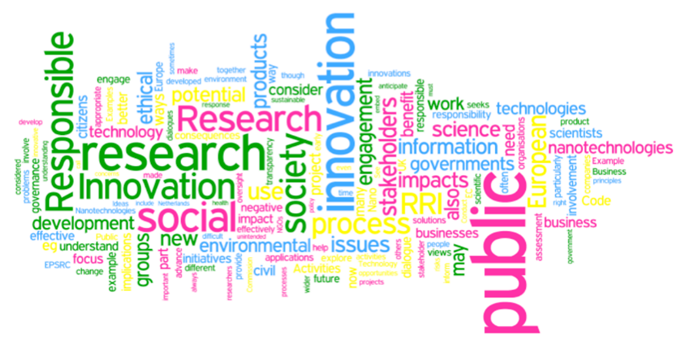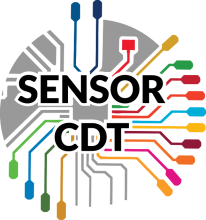
Responsible Innovation (RI) is very important to our CDT and indeed our commitment is already reflected in its name: Centre for Doctoral Training in Sensor Technologies for a Healthy and Sustainable Future. As stated by Stilgoe et al., responsible innovation in research means “taking care of the future through collective stewardship of science and innovation in the present”. We take this to mean that participants in the CDT, staff, students, companies etc. should be able to operate in an environment that promotes discourse on the implications of scientific and technological discoveries in an ethical, sustainable and balanced manner.
Sensors and Society
RI is particularly pertinent in the context of sensor technologies which now
impact on every aspect of life. Their rapid rise brings enormous opportunities to society but the growing dependence on sensor technologies and the data generated everywhere also brings challenges and uncertainties. Many important questions arise with the advent of new sensing technologies: Who owns sensory data? What implications do new sensor systems have for the security and privacy of people? How trustworthy is sensory data? What risks and dangers are
associated with new sensor technologies? What impacts do new sensor technologies have on environment and health? How can we use sensor technologies to sustain our food supplies and protect the environment? What is the life cycle of sensor technologies and how do we use sensors to manufacture more intelligently and economically? What are the ethical implications of new sensor technologies?
From the start, and throughout the CDT programme, we engage our students with such questions and provide an integrated framework of activities throughout both the coursework and practical phases of the programme, that fully encompass the UKRI AREA (Anticipate, Reflect, Engage, and Act) approach to RI. Ethical and legal aspects of sensor research are already taught in part of the
Principle of Sensing foundational course.
RI inspired training through Open Technologies
In the guided sensor project, we focus on the use and opportunities of Open Technologies that can be replicated at low cost and therefore are capable of reaching global communities. Students are guided through the design of a personal health care sensor device using open source and 3D printing technologies and learn how to collect networked data. This exercise lends itself ideally for RI inspired training. For example, students explore questions of data ownership and privacy in a practical context (what decisions will be taken
based on data transmitted from personal health sensors and who makes these decisions? What is the least intrusive way to accomplish the project objectives?). Issues of data security will be investigated (what is current legislation? Who is accountable? Is the current legal framework adequate?). These aspects will be informed by experts from MedImmune and the NHS.
RI in Sensor Team Challenges
Many of the Sensors CDT Team Challenges have been directed towards sustainability issues by, for example, the development of a sensor kit to test for arsenic in drinking water. Together with the British Antarctic Survey and the Cambridge Smart City initiative, the 2017 cohort Team Challenge went further by engaging with Cambridge residents to assemble and use easy-to-build sensors, providing open access to analysed data, bringing the world of science closer to the community and promoting engagement with issues relating to the quality of
the local environment. This example of citizen science is important to remind students of the ultimate goal of responsible innovation in improving quality of
life. Future Sensor Team challenges will be pitched around topics that are of direct societal significance and where RI is not only a guiding principle but an objective in itself. To encourage responsible innovation practices, an annual award is given to a student from the cohort who demonstrates outstanding commitment to responsible innovation.
RI Workshops
We organise several RI oriented workshops and conferences for the CDT. In
connection with team challenges, students attend a Science Policy workshop alongside the project management course they currently receive already. This workshop will empower the students in how to affect meaningful change by engaging with policy makers and to gain an understanding of the relationship between civil service, government and parliament. The workshop is organised
in consultation with the deputy chief scientific advisor of DEFRA (Dr Iain Williams) who acts on our External Advisory Board, and with input from the Cambridge Institute for Sustainability Leadership. Students explore how to optimise research plans to maximise impact on policy, and practice the analysis and drafting of white papers (e.g. through analysis of DEFRA’s classic white paper on
the Natural Environment from 2011 and an exercise to draft a commendation to the local council based on the outcome of the Sensor Team Challenge on air pollution). Together with BAS we have, and will again, organise workshops on 'The circular economy in practice – Challenges and Opportunities'. Students explore in which way sensors can play a role to preserve and enhance natural capital and to optimise resource yields. We also participate in the Cambridge node of the Virtual Institute for Responsible Innovation (VIRI) through hosting seminars on topics such as data privacy, digital vs. physical twins, the internet of things, implantable medical sensors. Decision making based on sensor technologies and the associated ethical implications are explored in workshops and lectures with experts in law, ethics, policy making and science from the Centre for the Study of Existential Risk. Together with the Centre for Global Equality (Dr Lara Allen) and the Cambridge in Africa Initiative (Dr Watu Wamae) we organise an event to explore opportunities for sensor technologies in low income populations and these bodies advise us also on future team challenges, which cover themes on sustainable development goals. One such example is on the development of a low cost, paper based, printable sensor that detects arsenic concentration in ground water in developing countries as a team challenge.


